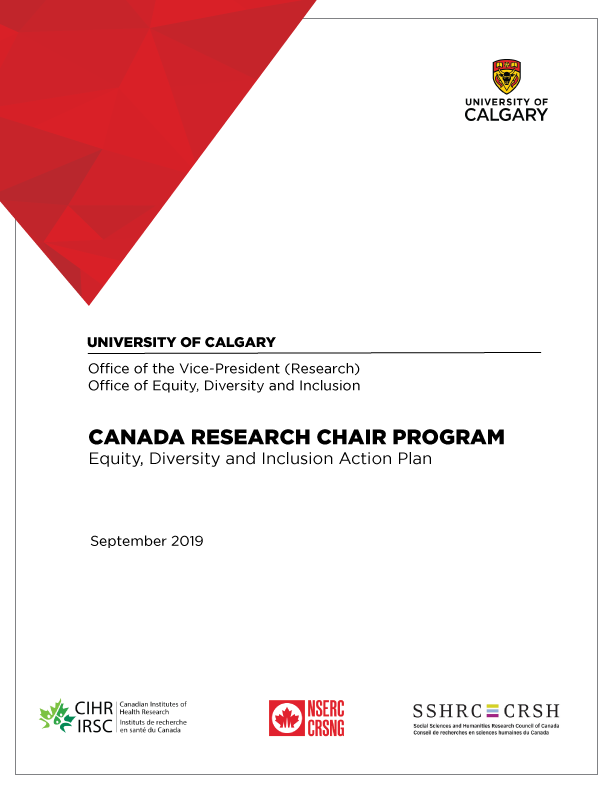Canada Research Chairs Program (CRCP)
Inclusive Excellence, Public Accountability and Transparency
About the Canada Research Chairs Program
The Canada Research Chairs Program (CRCP) is an initiative of Canada's Tri-Agency Program Secretariat (TIPs) and includes the Social Sciences and Humanities Research Council (SSHRC), and the Natural Sciences and Engineering Research Council (NSERC), and the Canadian Institute for Health Research (CIHR). The CRCP Secretariat is housed in SSHRC.
To be eligible for the program, institutions must establish equity and diversity targets to ensure individuals from the four designated groups (FDGs) (racialized individuals, Indigenous Peoples, persons with disabilities, and women and gender equity-seeking groups) to participate in the program. All participating institutions must clearly publish information related to the management of their chair allocations in this regard.
This page provides the required information to met the CRCP public accountability and trasnparency requirements, as outlined on the CRCP website. Please direct any questions or concerns regarding the implementation of UCalgary’s EDI Action Plan to the University of Calgary’s CRC Institutional Equity Officer, Associate Vice President Research (EDI), Dr. Malinda Smith at malinda.smith@ucalgary.ca.
Quick links
CRCP and UCalgary's EDI commitment
UCalgary equity targets
Meet our UCalgary CRCs
Current CRC job postings
This page was last updated on December 11, 2025.
Human rights, equity and the CRCP
In 2006, eight women academics – Dr. Marjorie Griffin Cohen, Dr. Louise Forsyth, Dr. Glenis Joyce, Dr. Audrey Kobayashi, Dr. Shree Mulay, Dr. Michele Ollivier, Dr. Susan Prentice, and Dr. Wendy Robbins launched a human rights complaint against the Canada Research Chairs Program (CRCP). The complaint was resolved with the 2006 Canadian Human Rights Settlement Agreement.
Six of the surviving women academics' petitions for compliance gave rise to the 2019 Addendum to the Canada Research Chairs Program. The CRCP’s commitment to human rights, equity, diversity, and inclusion (EDI) and the new terms of the 2019 Addendum are outlined in an open letter from the Chairs of the Steering and Management Committees of the Canada Research Chairs Program (CRCP), Ted Hewitt, PhD, Chair, CRCP Steering Committee and President, Social Sciences and Humanities Research Council, and Dr. Dominique Bérubé, PhD, Chair, CRCP Management Committee, and Vice-president, Research Programs, Social Sciences and Humanities Research Council. In 2021, a second Canadian Human Rights Settlement Agreement was reached between Dr. Amir Attaran and the Tri-Agency Institutional Program Secretariat (TIPs).
Read more: 2006 Canadian Human Rights Settlement Agreement | 2019 Addendum | 2021 Human Rights Settlement Agreement
There are two types of Canada Research Chairs (CRCs):
Tier 1 CRCs: These are tenable for seven years, and are renewable once, for up to 14 years. Tier 1 CRCs are for outstanding researchers who are recognized by their peers as world leaders in their fields. For each Tier 1 Chair, the institution receives $200,000 annually for seven years, for a total of approximately $1,400,000-$2,800,000.
Tier 2 CRCs: Tenable for five years, and renewable once, Tier 2 CRCs are for outstanding emerging researchers who are recognized by their peers as having the potential to lead in their field. For each Tier 2 CRC, the university receives $100,000 annually for five years, for a total of approximately $500,000 to one million dollars.
Currently, the CRCP allocates 2,285 research chairs to Canadian higher education institutions to attract and retain a diverse composition of talented researchers to Canada’s degree-granting institutions. The national CRC regular allocations, per tri-agency, as of June 2025 are:
- CIHR: 837 chairs (39% of total)
- NSERC: 837 chairs (39% of total)
- SSHRC: 474 chairs (23% of total)
There is a special allocation for small institutions of 137 chairs, split across the 3 tri-agencies. For more information on the national CRC allocations, please visit the CRCP website.
CRCP and UCalgary’s commitment to EDI
UCalgary is committed to research excellence and embedding equity, diversity, inclusion, and accessibility in the research ecosystem. Our CRCs represent a diversity of areas of scholarship, equity groups, and career stages. We are exceptionally proud of our CRCs and the excellence in both research and teaching that they bring to our institution.
Key to our CRCP activities are our CRCP EDI Action Plan and EDI Awareness Strategy, created in 2019. The CRCP EDI Action Plan was approved through the institutional governance process. UCalgary provides annual updates on our activities via the CRCP EDI Action Plan and Stipend Report.
UCalgary's CRCP Institutional Report outlines how our institution meets the program objectives for attraction and retention, research capacity, and equity, diversity and inclusion.
Nominating and recruiting CRCs at UCalgary
All Canada Research Chair positions must be filled in accordance with the CRC requirements for recruitment and nomination, which are based on the principles of openness, transparency and accountability. The CRCP actively monitors to ensure that these requirements are followed. The University of Calgary invites nominee applications from all qualified individuals.
Canada Research Chair requirements
Review the requirements for nomination and recruitment of CRCs on the CRCP website.
Read more
UCalgary Canada Research Chair utilization
The University of Calgary’s Canada Research Chair utilization spreadsheet is maintained by the Canada Research Chair Program and includes the number of Canada Research Chairs allocated to UCalgary, how many are filled and by whom, and types of “flex” moves.
Read more
UCalgary Canada Research Chair Advertisements/Job postings
Review all UCalgary CRC advertisements for active and archived positions.
Read more
UCalgary CRCP equity targets – Fall 2025
Using the program’s methodology, all participating institutions must establish equity targets to address systemic barriers to participation in the program for individuals from the four designated groups: racialized/visible minorities, Indigenous Peoples, persons with disabilities, and women. UCalgary’s equity targets for 2021-2029 are outlined in the CRCP Equity target-setting exercise document.
Visit the CRCP website for more information on overall program representation and to learn how equity targets are established.
"Research demonstrates that achieving an equitable, diverse and inclusive work environment leads to increased excellence, innovation and impact. As the Canada Research Chairs Program is founded on the principles of excellence, it is imperative that its design and implementation be exemplary and that it not perpetuate the systemic barriers that exist in academia and the research environment for racialized individuals, Indigenous Peoples, persons with disabilities, and women and gender equity-seeking groups."*
In 2021, the CRC program announced the timelines for phasing in new equity targets principally based on Canada’s population for each of the four designated groups in the program. The table below indicates the interim targets for 2022, 2025 and 2027, final targets for 2029, and current representation among UCalgary’s active chairs. Note that as a large institution, UCalgary must now reach these targets for both Tier 1 and Tier 2.
*Canada Research Chairs Program - Equity, Diversity, and Inclusion
Upcoming equity targets for Canada Research Chairs
| 2022 targets | 2025 targets | 2027 targets | 2029 targets | Tier 1: Current representation | Tier 2: Current representation | |
|---|---|---|---|---|---|---|
| Indigenous Peoples | 1.5% | 2.3% | 3.5% | 4.9% | Meeting 2025 target* | 12.5% |
| Persons with disabilities | 4.5% | 5.3% | 6.3% | 7.5% | Meeting 2025 target* | Meeting 2025 target* |
| Racialized individuals | 16% | 18% | 20% | 22% | 26% | 30% |
| Women & gender equity-seeking groups ** | 33% | 37% | 37% | 51% | 43% | 63% |
Table updated December 10, 2025.
* Details of data suppressed to protect privacy when number of chairholders in a category is less than 5
** Individuals who self-identify as women, transgender, gender-fluid, nonbinary and Two-Spirit
Employment Equity Policy
This policy aims to establish the terms under which the University of Calgary implements employment equity under the Government of Canada Federal Contractors Program. This policy applies to all faculty and staff at the University of Calgary.
Workplace accommodation policy
This policy facilitates arrangements that eliminate barriers to ensure that those who are otherwise able to work are not excluded from doing so based on a Protected Ground.
Protected Disclosure and Research Integrity Office
The Protected Disclosure and Research Integrity Office (PDRI Office) serves as a centralized resource to all members of the university community and the central point of contact for dealing with Protected Disclosures and Research Integrity issues
Sexual and Gender-Based Violence Policy
The university is striving to create an equitable, inclusive environment shaped by a culture of respect and safety. This includes efforts to provide an appropriate response to Sexual and Gender-Based Violence.
Resources and training

UCalgary EDI Resources
Literacy and education are crucial mechanisms used to ignite change and foster inclusion. The impact of training and education depends on community members' understanding and committing to lifelong learning, practicing mindfulness and taking responsibility for building an inclusive university.

UCalgary Academic Selection Toolkit
This Toolkit has been prepared to support those involved in the recruitment and selection of academic staff positions. It will introduce best practices in recruitment and selection, equitable and inclusive hiring, legislative requirements, and University policies.

Bias in Peer Review – A Training Module
This interactive module is designed to promote an understanding of unconscious bias and its effect on the peer-review process. It will also provide strategies for mitigating bias during the review process.
Contact
Dr. Malinda Smith
Institutional CRC EDI Advisor (on leave)
Associate Vice-President Research - EDI | Professor, Political Science
malinda.smith@ucalgary.ca
Dr. Robert Thompson
Acting Institutional CRC EDI Advisor (2025-26)
Associate Vice-President (Research) | Professor, Faculty of Science
Dr. Susan Skone
Institutional CRC Advisor
Associate Vice-President (Research) | Professor, Department of Geomatics Engineering
Jaya Dixit
Manager, EDI in Research, Institutional Programs Division | Office of Research Services
Dr. Ovo Adagha
Senior Analyst - Research Chairs | Institutional Programs | Research Services




